English Edition

- By CNI
- Category: English Section
- Hits: 1224
CNI News
24 October 2023
The Ministry of Labor has requested an opinion from the Myanmar Overseas Employment Agencies Federation (MOEAF) to increase the license insurance fee by three times from overseas employment agencies, the agencies told CNI News.
The license insurance rates that will be increasingly collected are 1,000 lakh kyats from 250 lakh kyats for overseas employment agencies and 200 lakh kyats from 50 lakh kyats for overseas employment agencies (Thailand) reportedly.
Because the amount that will be collected was too much, there will be negotiation between the Ministry of Labor and the MOEAF, U Win Myint, managing director of Lucky Overseas Employment Agency told CNI News.
" The ministry has sent a letter to the MOEAF relating to the license insurance fee. MOEAF will hold a meeting and negotiate for the sake of its members. It depends on the decisions by the ministry and members. The members will pay as able as they can. The request that asks the members to pay within a period will be kind of. It will be a rate that both sides will accept. All is not doing very well in the economy for the time being and there is almost no demand at the moment. So many licenses have been granted, so there have been many competitors." said U Win Myint.
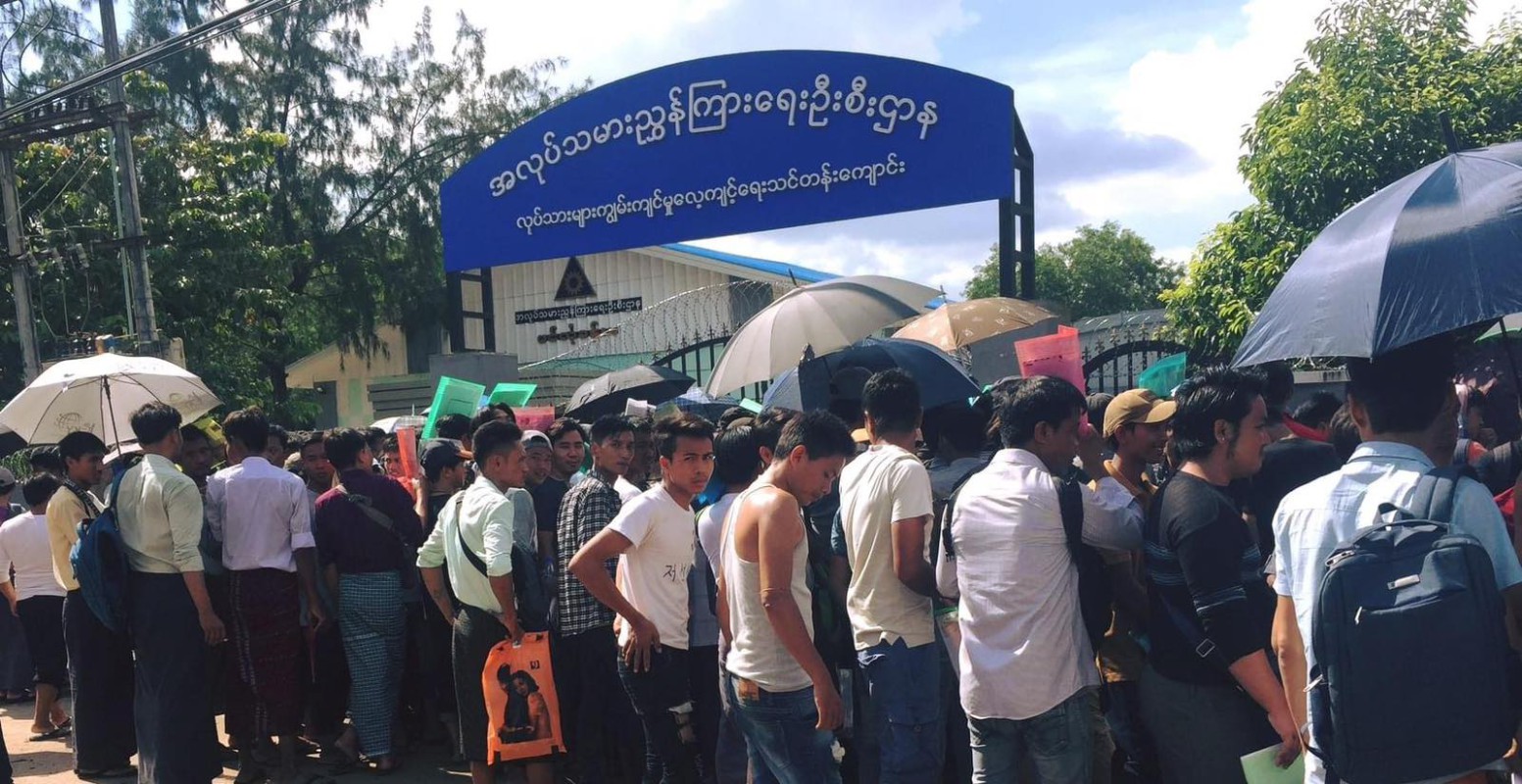
Those who are waiting in line in front of the Directorate of Labor
the rates of MOEAF that reported back to the ministry were 400 lakh kyats for overseas employment agencies and 100 lakh kyats for thai license, said an agency.
To raise the license fee was decided at the Overseas Employment Supervisory Committee Meeting held in July and at the MOEAF meeting held in September reportedly.
Because not every agency was okay, some of agencies would not convenient to pay the amount that the ministry has raised, agencies pointed out. Moreover, because there are unscrupulous agencies, they could collect more service charge by reason of rising license fee, Ko Thar Gyi helping migrant workers told CNI News.
" By reason of raising to 1,000 lakh kyats from 250 lakh kyats for license fee, some agencies can exploit Myanmar migrant workers. There are many agencies that don't take responsibility and accountability. We have to watch whether some agencies will raise their service charges or not. Many unscrupulous agencies are collecting 14 to 20 lakh kyats for service charges even though three lakh has been designated. By reason of raising license insurance fee, some agencies probably will raise their service charges from ignorant villagers who will go abroad for work. At a time when you can't get a job easily, raising service charges is not suitable." he said,
There were over 300 licensed overseas employment agencies in 2021 in Myanmar and but at present, nearly 470 licensed agencies.

- By CNI
- Category: English Section
- Hits: 812
CNI News
24 October 2023
Myeik islands tourism industries in Tanintharyi Region that have been suspended for over two years due to the Covid-19 pandemic have restarted, according to the Ministry of Hotel and Tourism. Currently, tourists have entered Myeik islands reportedly.
Mainly because Kawthaung-Ranong border gate has been opened, Myeik islands trips have restarted, an official from the directorate of hotel and tourism in Dawei District told CNI News.

Myeik Islands
" Kawthaung-Ranong border gate had been closed during the Covid-19 pandemic. Because the border gate has been opened since March, 2023, day trippers from the Thai side come here. And there are also guests who will come by motor-boat. Moreover, there are also guests who will come by yacht. They all mainly visit Myeik island. It has reopened during the tourist season, some local tourism companies are advertising. Because Myeik islands trips had been closed for about two and a half years due to the Covid-19 pandemic. It is a bit difficult for us to reach the situation before the Covid-19 pandemic. We have expected we will be able to reach gradually the situation before the Covid-19 pandemic." he said.
Myeik island trips contain Themee Hla, Lay Kyon, Don Waterfall, Don Nyaung Hmaing, Smart Island, Padan Island, Kyelleik and so on reportedly. Although Myeik trips are being arranged, because of too much expenses for accommodation, travel and food, tourist arrival might be few, U Arka, a tourism entrepreneur from Myeik City, told CNI News.

Myeik Islands
" Transportation charges and commodity prices are costly. And charge for electricity use is also expensive. So, hotels can't reduce the price. You can go there if you have 6 to 7 lakh kyats before the Covid-19. Now you'll have to spend about 13 lakh for the fuel. It will cost you about 20 lakh kyats altogether including service charges. So, the number of the guests who can spend that much is just few. If you come by flight, flight fare will cost you 2 lakh kyats. Round trip will cost four hundred thousand. So, people are going to Shan State, Bagan, Inle and Chaungtha. But wealthy people might come to Myeik islands. It's not convenient to come by car because battles are taking place. So, guests who will come may be less." he said.
As Myeik islands trips, it will cost 2 lakh kyats each from Lay Kyun to Thamee Hla Island, 2.5 lakh kyats each from Don Waterfall to Smart Island, 3 lakh kyats each from Smart Island to Padan Island and 3.5 lakh kyats each from Kyelleik to Smart Island, according to tourism industries.
There are over 800 islands in Myeik region and Over and underwater scenes can be viewed and Salon ethnicity can be studied as well.

- By CNI
- Category: English Section
- Hits: 781
CNI Article
24 October 2023
Peace has been built since 1948 when Myanmar gained her independence until today.
When peace was being built, it was built in various forms - an exchange of arms and peace, an exchange of surrender and peace as well as peace building without surrender.
However, stakeholders were not able to reach an agreement that could lead to a cease of the armed conflict and solving political problems.
And then, when the government led by U Thein Sein came to power, the Nationwide Ceasefire Agreement (NCA) came into being. The NCA has been the best agreement up to now among Myanmar peace-making attempts and it is also a prestigious contract.
The NCA contains seven chapters and thirty-three clauses. It is the only exit that is able to amend the 2008 constitution that is not easy to be amended. Moreover, it is an agreement from which stakeholders can discuss and find a solution for the establishment of a democratic federal union.
The NCA contains provisions such as how to protect civilians, how two organizations keep from fighting, how to meet and discuss in case of fighting, how to find a solution for political disagreements and how to protect from recruitment by armed organizations.
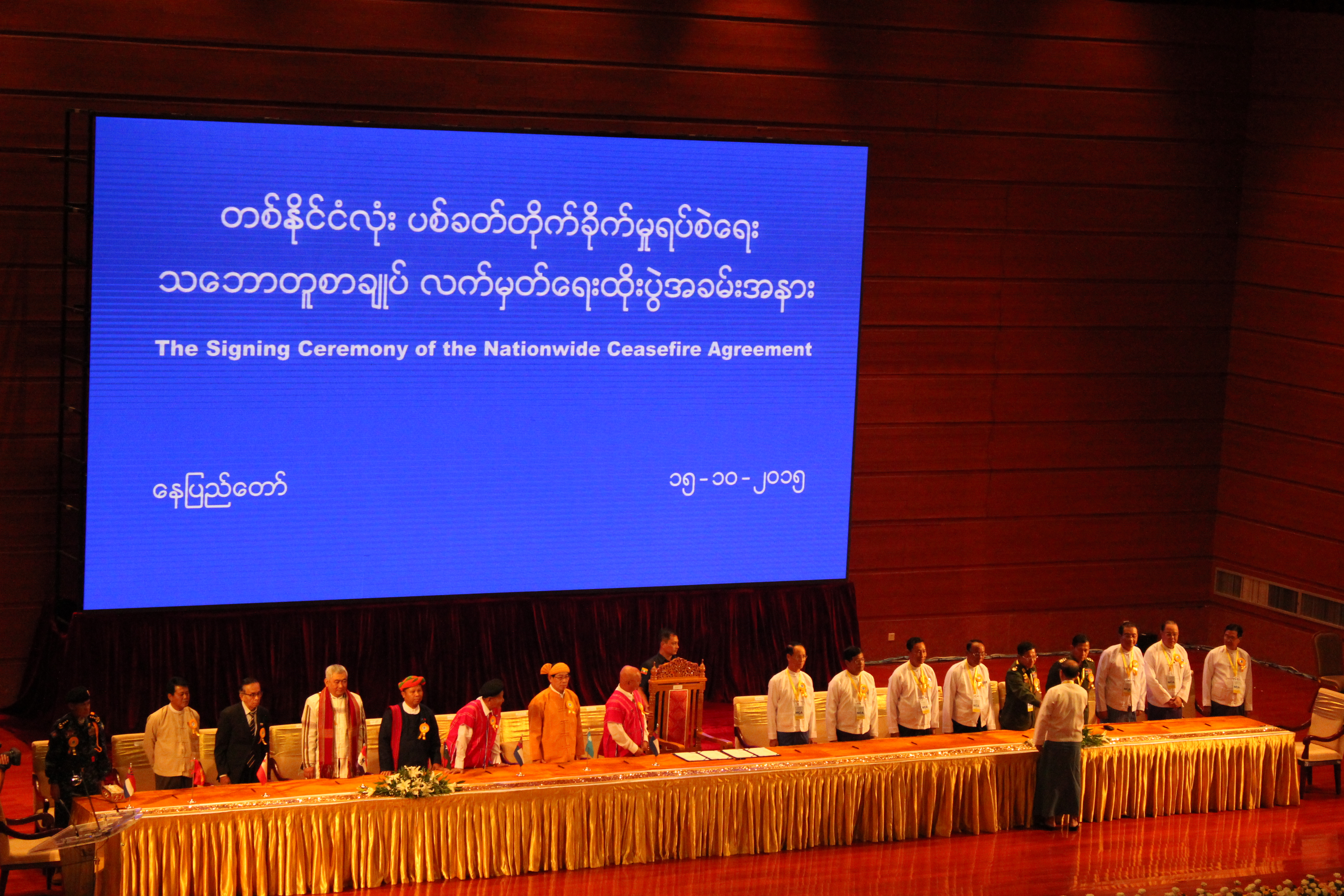
However, weak points that are not included in the NCA are whether a certain NCA signatory has the rights to temporarily suspend or to entirely resign from membership.
Moreover the NCA doesn't contain that under what circumstances the agreement is void. It is questionable whether resignation and temporary suspension from membership are appropriate or not.
Not very long ago, three NCA signatories . the Karen National Union (KNU), the Chin National Front (CNF) and the All Burma Students Democratic Front (ABSDF) stated that the NCA has been void.
However, seven remaining NCA signatories said that the NCA still.has not been void. In the same way, the Tatmadaw also said that the NCA was not void because it was an agreement that was approved by the Hluttaw and it was signed by witnesses local and abroad. So, there are arguments with one another about whether the NCA is void or not, and there are also political exploitations.
Having carefully studied these circumstances, is the NCA really broken? Who are destroying the NCA, because a person or organization says that the NCA has been void, is it an agreement that can be broken? We should consider whether there are political exploitations using the NCA as a tool.
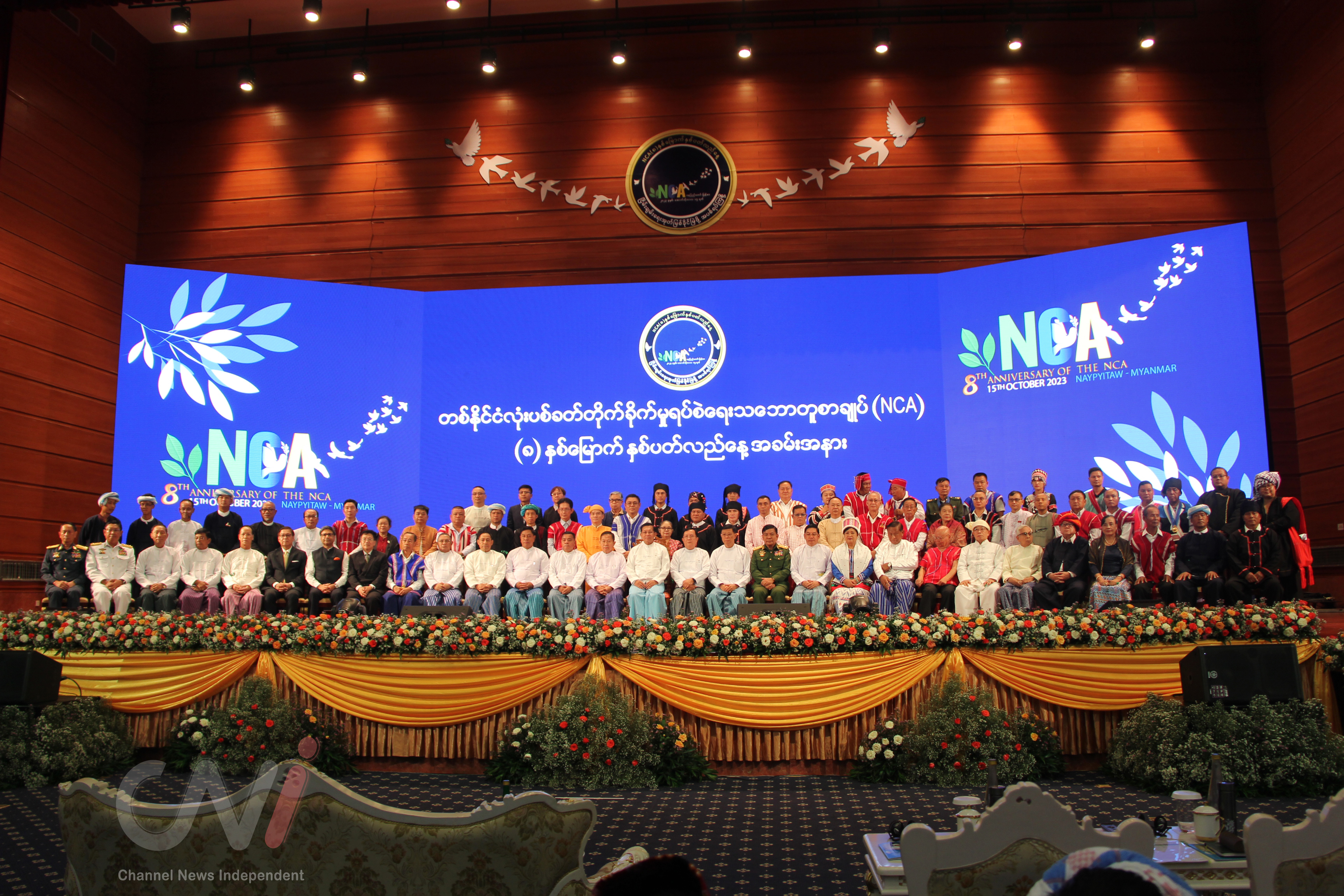
Firstly, KNU, CNF and ABSDF pointed out that the NCA has been void because there were (1) no Pyidaungsu Hluttaw (2) no government and Hluttaw and (3) the Tatmadaw conducted a coup d'etat without solving a political problem by political means.
To talk about the Pyidaungsu Hluttaw, only if there was the result of the political talks or the agreement that came out after the union peace conference, would it be submitted to the Hluttaw.
So, if there is no Pyidaungsu Hluttaw now, when there will be Pyidaungsu Hluttaw in the future, after the agreement is submitted to the Hluttaw and the Hluttaw's approve can be taken. This should not be considered a problem. Moreover, soon after the agreement is submitted to the Hluttaw, it is not implemented at once. It can be implemented when necessary agreements are reached.
Although submitted to the Hluttaw, there were many agreements that could not be implemented under the governments led by U Thein Sein and Daw Aung San Suu Kyi.
In relation to the reason that there is no government and Hluttaw, it is controversial. The Tatmadaw toppled down the civilian government and formed the State Administration Council. And then SAC has carried out for administration, judiciary and legislation.
Moreover, because U T Khun Myat is still alive as the speaker of Pyithuhluttaw, some people have considered that there are the government and Hluttaw.
Moreover, Although the Tatmadaw has stated that the result of the 2020 general election was cancelled, because MPs who came out from the 2015 general election have not been declared illegal, we can generally consider that there are still MPs.
Thirdly, there is no clear and precise position in saying that political problems must be solved by political means. Is that an agreement between the Tatmadaw and EAOs or between the government and the Tatmadaw? it is not clear.
Next, If the Tatmadaw took the State power for some reason or a state of emergency was declared, because there was no provision saying that the NCA is void, the NCA has some weak points.
However, there were the Tatmadaw, the government and the Hluttaw under the NLD government. At that time when the political problem was being solved by political means, the KNU stated that it would suspend attending the official meetings relating to implementation of peace process on 10th November 2018.
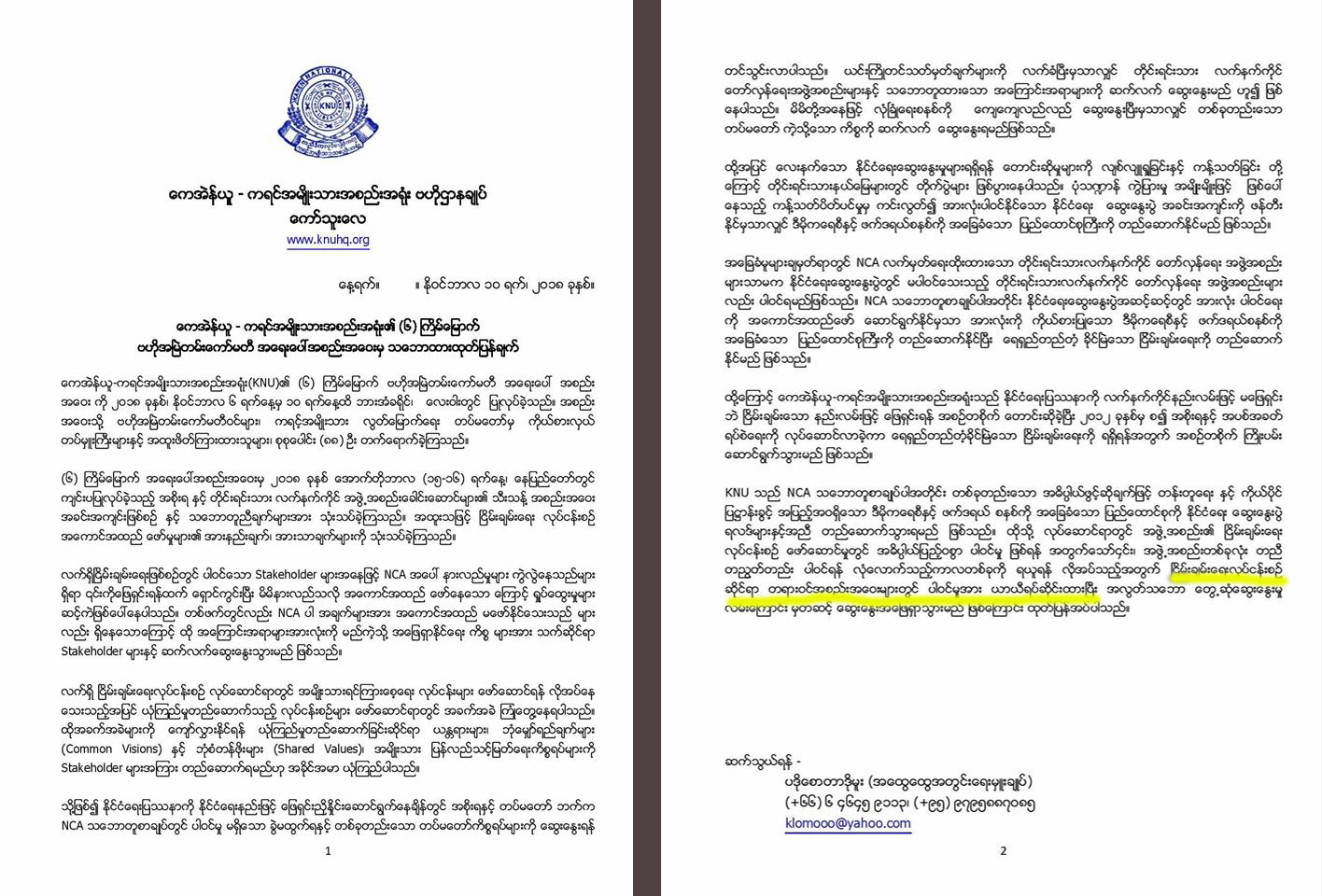
After the KNU's statement was released, peace processes stopped and the KNU did not attend the meetings relating to implementation of peace processes anymore.
When something like that happened, in accordance with the NCA, agreements regarding at what time what things must be performed and what meetings should be held became stagnant and the process could not be implemented.
Such implementations could not be conducted from 18th November 2018 to 1st February 2021 when the Tatmadaw overthrew the NLD government.
However, the political landscape after 1st February 2021 is separate. So, it is something to think about who is destroying the NCA. Looking back, after the KNU stated that it had suspended attending the meetings on implementation of peace processes, the Union Peace Conference – 21st Century Panglong that was held every six months could not be held anymore.
Moreover,the Joint Implementation Coordination Meeting (JICM) of the NCA that was held every three months was 8finally held on 28th February 2016 as the 7th meeting and it could not be held until 1st February 2021.
Although political disagreements could be solved at the JICM, doesn't that participation in peace processes that had been temporarily suspended violate the provisions in the NCA? And then, the Union Peace Dialogue Joint Committee (UPDJC) that was held every two months could not be held until 1st February 2021.
Moreover, national level political discussions, political framework preparation and review meetings, the meetings of Joint Ceasefire Monitoring Committee - Union Level (JMC-U), JMC meetings and the meetings of the State Level Joint Ceasefire Monitoring Committee (JMC-S) also stopped.
Looking back after 1st February 2021, although you might say that the Tatmadaw caused the bloodshed of the civilians and did not solve the political problem through political means but relied on weapons instead.
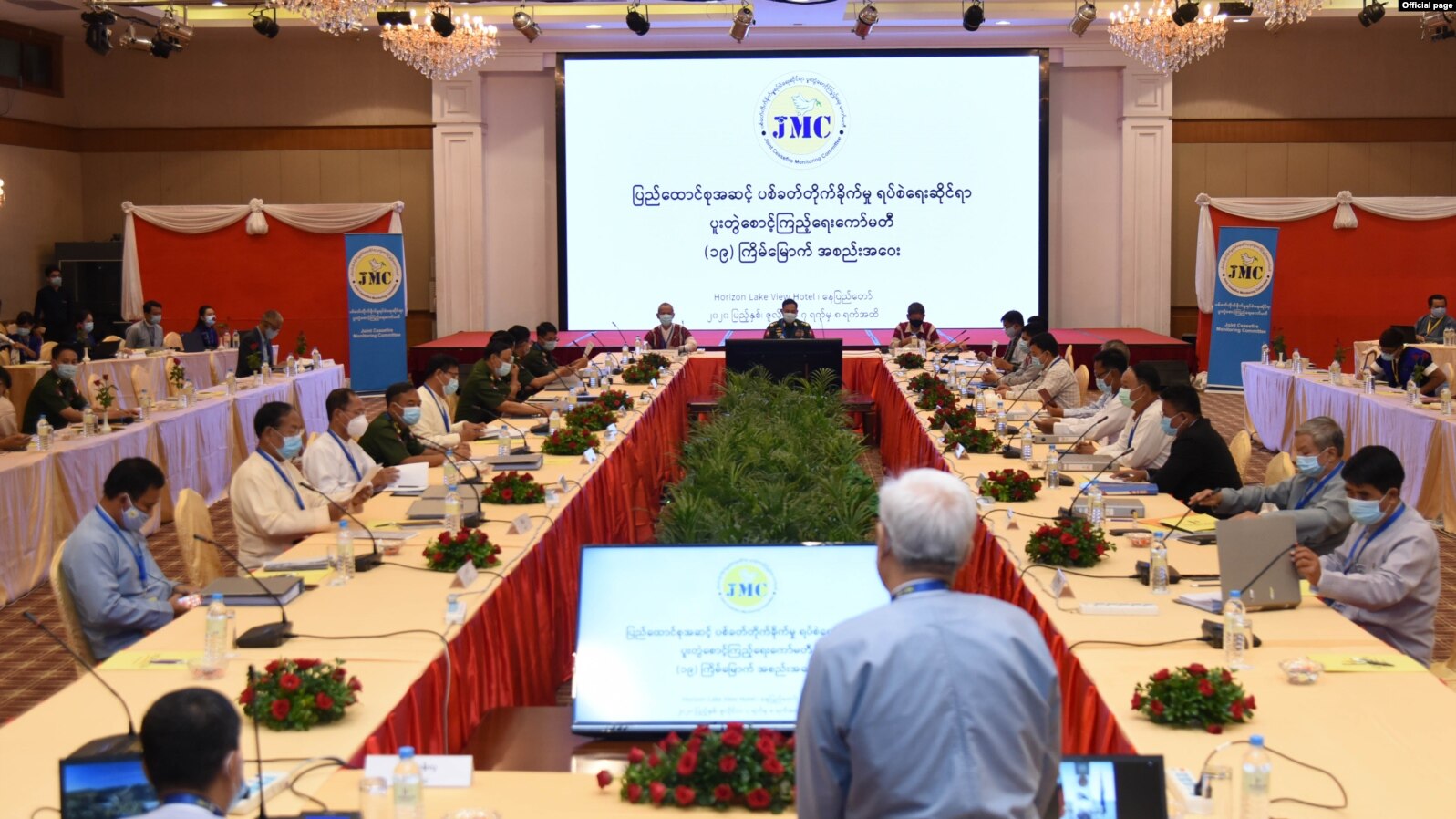
In the same way, other armed organizations including KNU, CNF and ABSDF recruited, armed, neglected civilians being killed, created battles at Lay Kayt Kaw, a symbol of peace, bore armed people in Chin State and carried out battles against the provisions in the NCA, some people pointed out.
As a matter of fact, the NCA has not been working since November 2018. So, who is destroying the NCA? It is questionable. In fact, instead of blaming one another relating whether the NCA is void or not or who has destroyed the NCA, how to implement the provisions in the NCA should be thought of.
Through implementation of the NCA, how to overcome the current Myanmar crisis and how to build a peaceful democratic transition and how to build a federal union should be thought of and performed, I think.
" If the implementation of the peace process fails, the union will disintegrate as well." said Gen.Yawd Serk at a press conference held in Thailand on 27 October 2019.
In the same way," We all understand it is necessary to keep the promise. The current difficulties are not because of the NCA but because of weakness in implementation, necessity to follow the agreement and different understanding." said Daw Aung San Suu Kyi at the 4th anniversary celebration of the NCA.
If you wanted to build a federal union, you should beware that gentleness and magnanimity were needed, she added.

- By CNI
- Category: English Section
- Hits: 654
CNI News
20 October 2023
Booking hotel rooms in Bagan and Chaungtha for Thadingyut Holiday was almost full, local officials of the directorate of hotel and tourism told CNI News.
Booking hotel rooms was from 27th to 30th October and this year the influx of foreign tourists was increasing, U Zaw Weik, chairman of Myanmar Hoteliers Association (Bagan Zone) told CNI News.
" Booking hotel rooms in Bagan for Thadingyut Holiday was almost full. Most of bookings are four days long during the Thadingyut holidays. It was just a few guests before the holiday. The rain has stopped in Bagan for about ten days. Guests come here not many not few. Foreigners are here too. Some foreigners such as Koreans, Greek and Thai come here as a group tour, but not so many. But in comparison with the last year, more foreigners have entered." he said.
At present there are a few hotel rooms for rent through out the Bagan region and booking hotel rooms this year for Thadingyut holiday has increased than the last year, U Win Aung, Deputy Director of Ministry of Hotel and Tourism (Bagan Branch) told CNI News.
The reason why more guests will come to Bagan is possible because of easy transportation and because travellers can go to Bagan by air, by car and by train, he added.
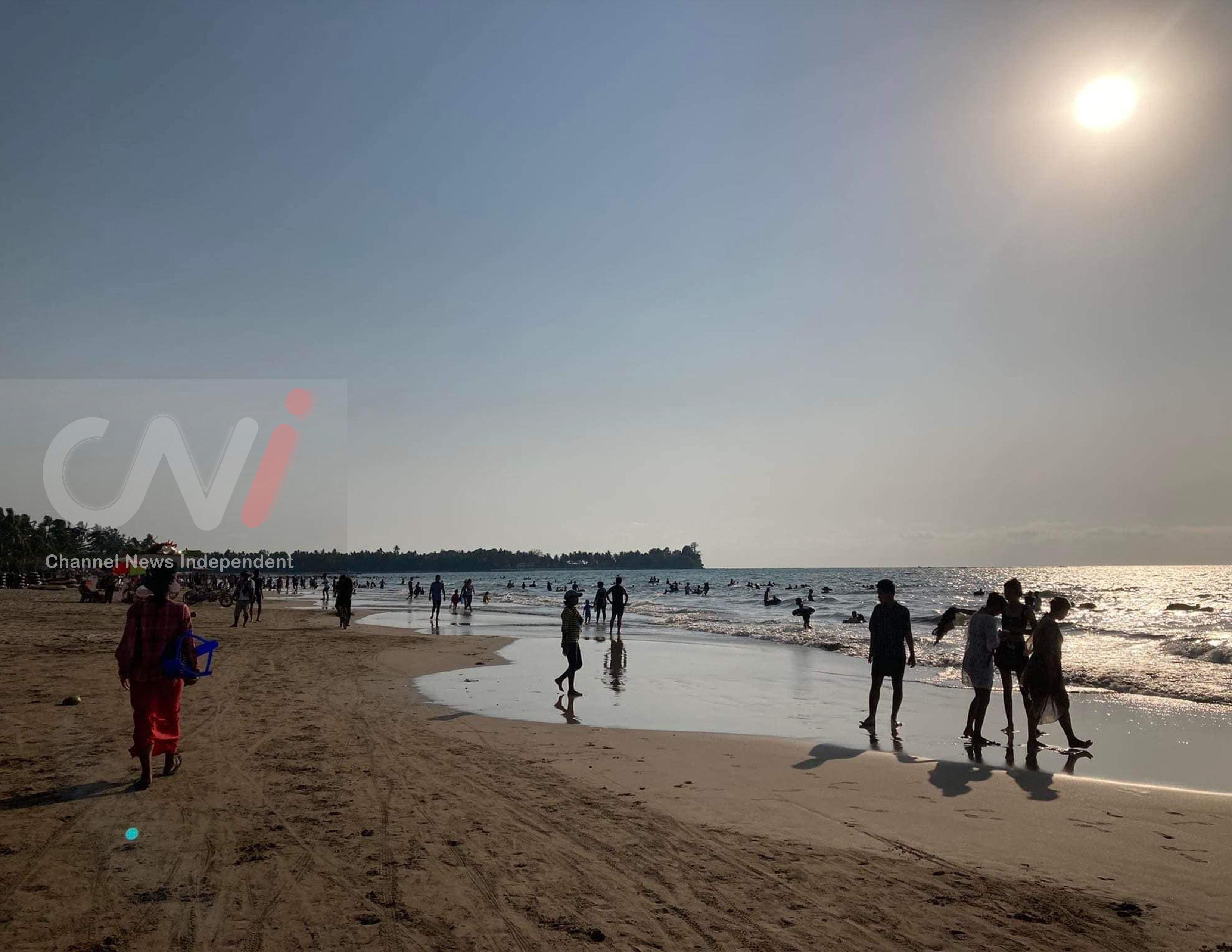
Tourists who have come to Chaungtha Beach
" Because during the school holidays, families will come and friends will come. Especially, among the holidays, one is the special day for Buddhists. They will do charity work here. Here is spacious. There are many pagodas here. But it's not crowded at the same place. Guests might enjoy going from one place to another. Hotels are running some promotions such as selling food with entertainment. Some hotels are already releasing balloons. Promotions depend on the situations of hotels." said U Win Aung. Tourist arrivals to Bagan region have increased by 50 percent compared to last year, he added.
In Chaungtha, a beach area, hotel room bookings are already about 90 percent full, U Kyaw Zeya, Deputy Director of the Ministry of Hotel and Tourism (Ngapali Branch) told CNI News.
Moreover, market festival and lighting festival would be held during Thadingyut holidays to support the small and medium enterprises (SMEs) in Chaungtha region, he said.
" Many guests came here in Chaungtha last year. But this year guest arrival has increased than last year. 500 to 600 guests come each day in the weekdays, but on the weekend, 1,300 to 1,400 guests come each day. SME market festival will start on 21st October for the development of tourism in Thadingyut. The products from eight districts will be shown with the supervisions of district administrators. Most of the people who come to Chaungtha are domestic tourists. Foreign tourists come to Nwe Saung because its beach is about nine miles long. But Chaungtha's beach is only 1.5 miles. Foreigners don't like short beaches." he said.
However, hotel room bookings in Shan State where a lot of tourists tended to come in Thadingyut and Tazaungdaing are fewer than the last year, according to the Shan State Directorate of Hotel and Tourism.

- By CNI
- Category: English Section
- Hits: 744
CNI News
20 October 2023
The suspension of party registration caused distrust in politics, U Ko Ko Gyi, chairman of the People's Party (PP) told CNI News.
The Union Election Commission should reply the parties that have not got party registration sheets why the commission has not issued the registration, he said.
" The Union Election Commission has registered some parties and others have not been registered, and we are not informed why. To tell you the truth, UEC plays an important role to make the public believe the State Administration Council (SAC)'s political road map. So, among our political circles, UEC has become quite critical. Especially, when well-known parties such as NLD and SNLD have not been able to register in the UEC, UEC has suspended rights to registration of the parties carrying out for democracy and federalism. It causes distrust in politics, I think." he said to CNI News.
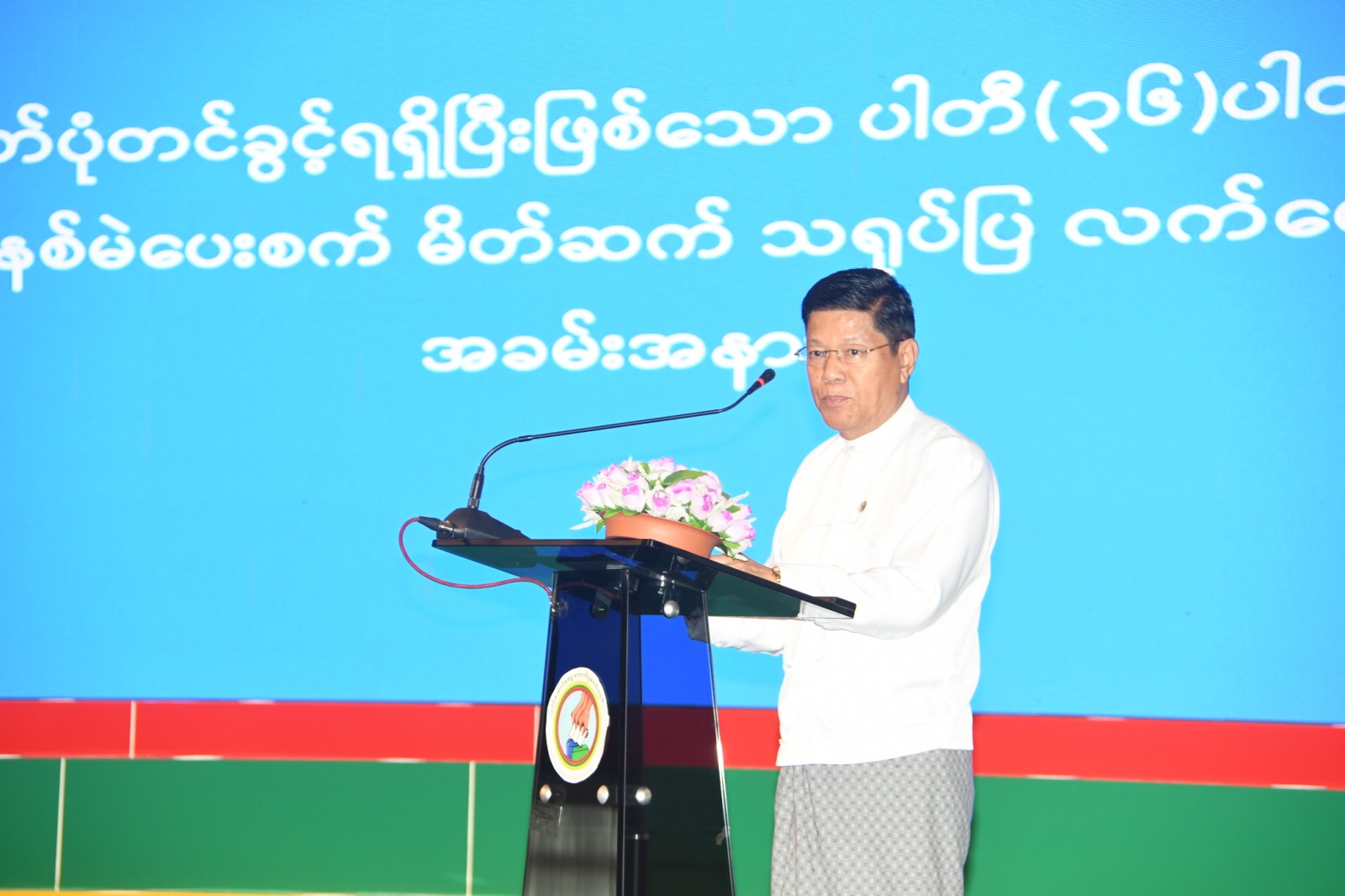
While seeing U Thein Soe, chairman of the Union Election Commission
Although the PP has applied to be registered as a political party for nearly seven months, the party has not been registered as yet. When the public belief in political means has decreased, the actions of the UEC kind of are making the public not to believe in politics, he said
Laws and by-laws relating to re-registration of political parties were issued on 31st January 2023 and political parties were asked to re-register within 60 days.
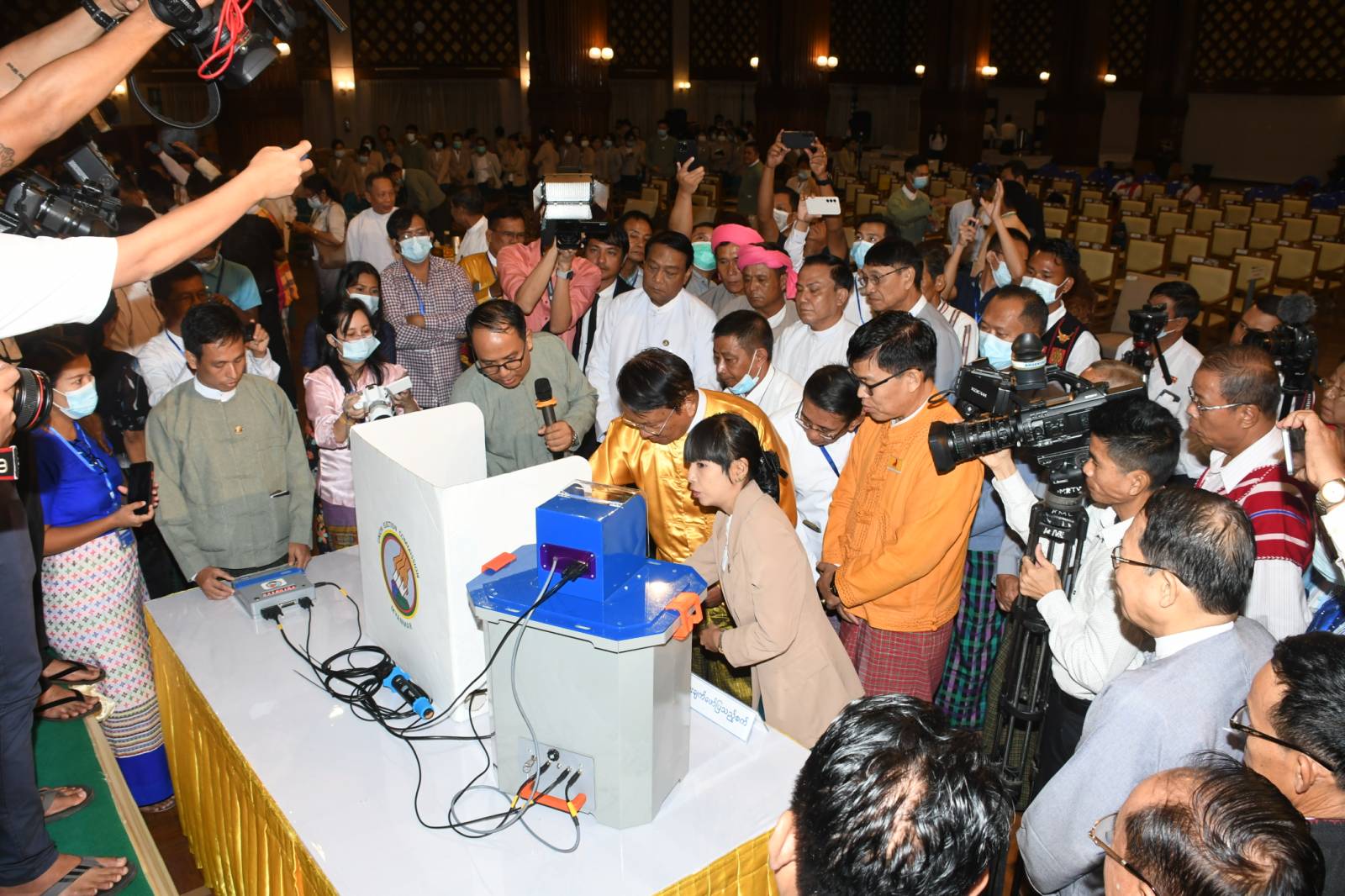
It was difficult to understand why their Mon Unity Party had not been registered, Naing Than Swe, spokesperson of the MUP, told CNI News. " It's hard to say how I understand. Some parties have not been registered like us. In September, our members of the Central Executive Committee were re-checked and asked. I don't know whether other parties were re-checked or not." said Naing Than Shwe.
Although the PP has registered as a party that will organize all over the country, it has not been registered as yet reportedly.
In the same way, the Arakan National Party (ANP) and the Mon Unity Party (MUP) have registered as state-level parties. However, the two parties have not been registered up to now reportedly.

- By CNI
- Category: English Section
- Hits: 742
CNI News
20 October 2023
It was not effective to issue import EV permit to salary remitters depending on the amount of salary remitted, said businessmen and economic analysts.
There are a very few Myanmar citizens who can transfer 200,000 US dollars after one year of working abroad.
So, Myanmar migrant workers would not be able transfer 50,000 US dollar within one year, said businessmen. When EV cars are imported, one car at a time cannot be easily imported.
So, even though an EV import permit was got, it was not easy to import EV cars. If overseas workers were persuaded by way of tax relief, they could transfer their salaries to Myanmar, U Thet Zaw, an economic analyst, told CNI News.

US dollar
" The government has started their step to stop illegal remittance, I think. Those who are getting very outstanding salaries can transfer US$ 200,000 within one year. I don't think Myanmar workers in Thailand can transfer that much. They might not transfer even US$ 50,000 because a Myanmar worker in Thailand tries to get at least 400,00.0 to 500,000 kyats for his living cost a month. Better workers can get about 700,000 kyats a month. They can get 8,400,000 kyats a year. But US$ 50,000 is equal to 15,000,000 kyats. So, how can they transfer 15,000,000 kyats? But according to the statement, EV import permits depend on the amount of money transferred. If you transfer a large amount of money, you may get EV car import permit and if you transfer a small amount of money, you may get EV motorcycle import permit. There is a bit to think about how to import it. If you import EV through agent, you'll have pay for the agent. But the government can persuade overseas workers by way of tax relief." said U Thet Zaw.
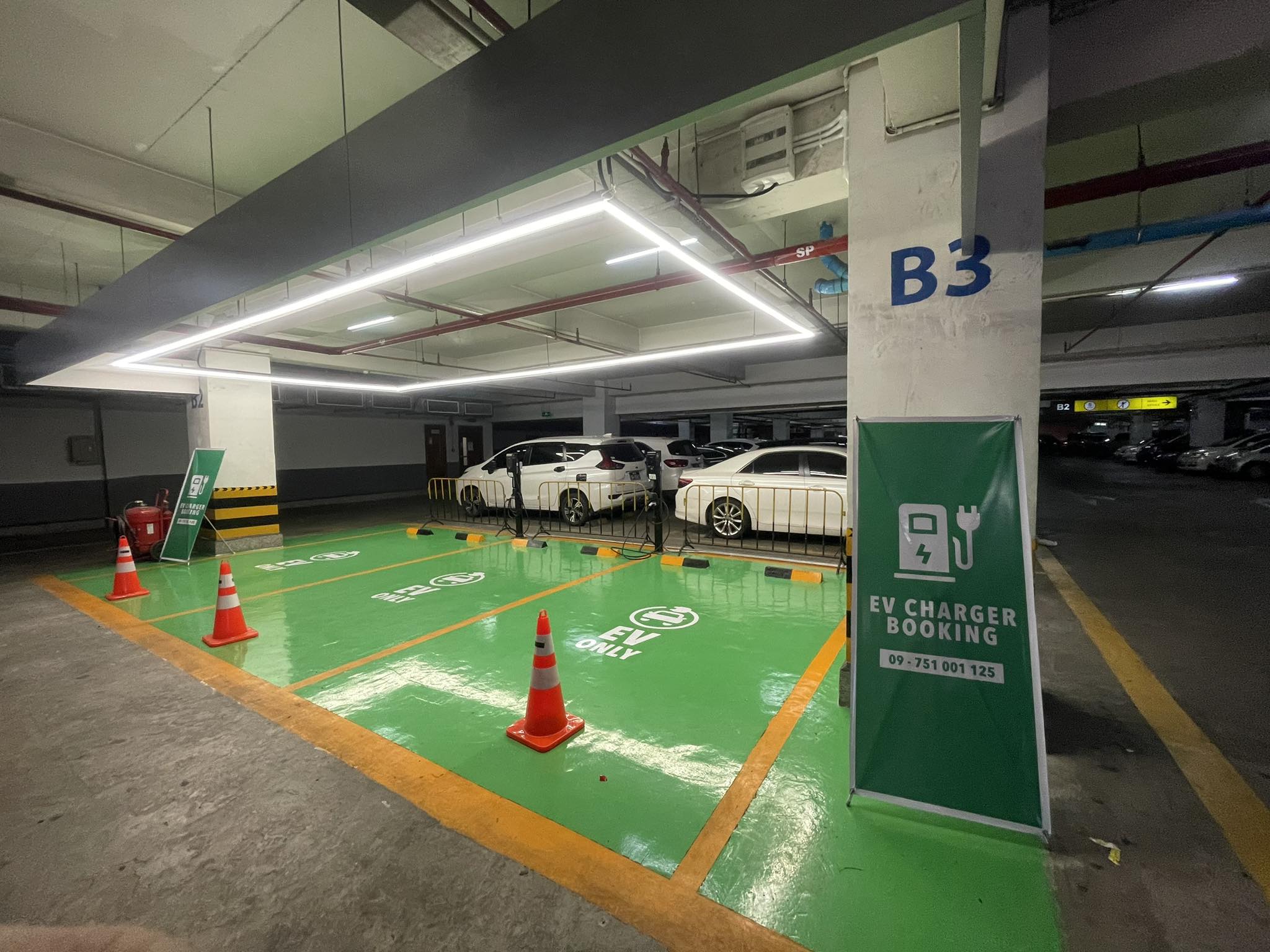
An EV car charging station found in Yangon
If Myanmar citizens who are working abroad transfer US$ 200,000 or 50,000 and above to Myanmar through an official bank channel, they will be allowed to import an EV car or an EV motorcycle per year with the money that is equal to 5 percent of the money transferred, which the Ministry of Commerce has stated.
However, as there were a very few Myanmar citizens who could transfer the amount of money designated, it would not impact on the local car market, U Aung Pyae Sone, a car policy expert, told CNI News.
" It won't impact the local car market a lot. If a Myanmar citizen who is working abroad transfer US$ 200,000 to Myanmar, his salary must be 18,000 US dollars. There are many people whose salaries are 16,000 to 17,000 US dollars in many foreign countries. But among Myanmar citizens, those who get that amount are very rare. The people whose income is above 200,000 US dollars might not buy an EV car. The incentive that will allow to import an EV will not be effective, I think." said U Aung Pyae Sone.
In permitting the importation of electric motorcycles, if one cannot import an EV motorcycle because he cannot afford the value of vehicle, joint import with others will be allowed reportedly.

- By Webmaster 3
- Category: English Section
- Hits: 594
CNI News
19 October 2023
Some Myanmar people are in trouble in Thailand after they were cheated by brokers who took them to Thailand.
Most of those who were cheated are from Bago Region and the brokers told them to make them get evidence documents, one of the victims of fraud told CNI News.
Because Thai and Myanmar brokers guaranteed that they would provide service for victims to be included in the name list, to get passports and to find jobs, the victims had to pay the brokers 1,300,000 to 1,700,000 kyats each and the victims have been there in Thailand for several months reportedly.
The victims of fraudsters have been in trouble because they haven't got documents and jobs at present, Ko Wai Lin Aung, a victim of fraud, told CNI News.
" I have paid 1,700,000 kyats. I was told I'll have to pay 3,200,000 kyats. I was told they would send me to Bangkok at the end of July. They asked me to come to Thailand after borrowing money with interest if I didn't have enough money. So, I came to Thailand after borrowing money with interest. Although they said I can get a job at the end of July, now it's October. When I ask them how they would do for the documents, they replied that I'm included in the name list. Now we can't eat enough fish paste. And electricity is not available for us as well. When I tried to charge my phone at the house of agency, I was expelled."he said.
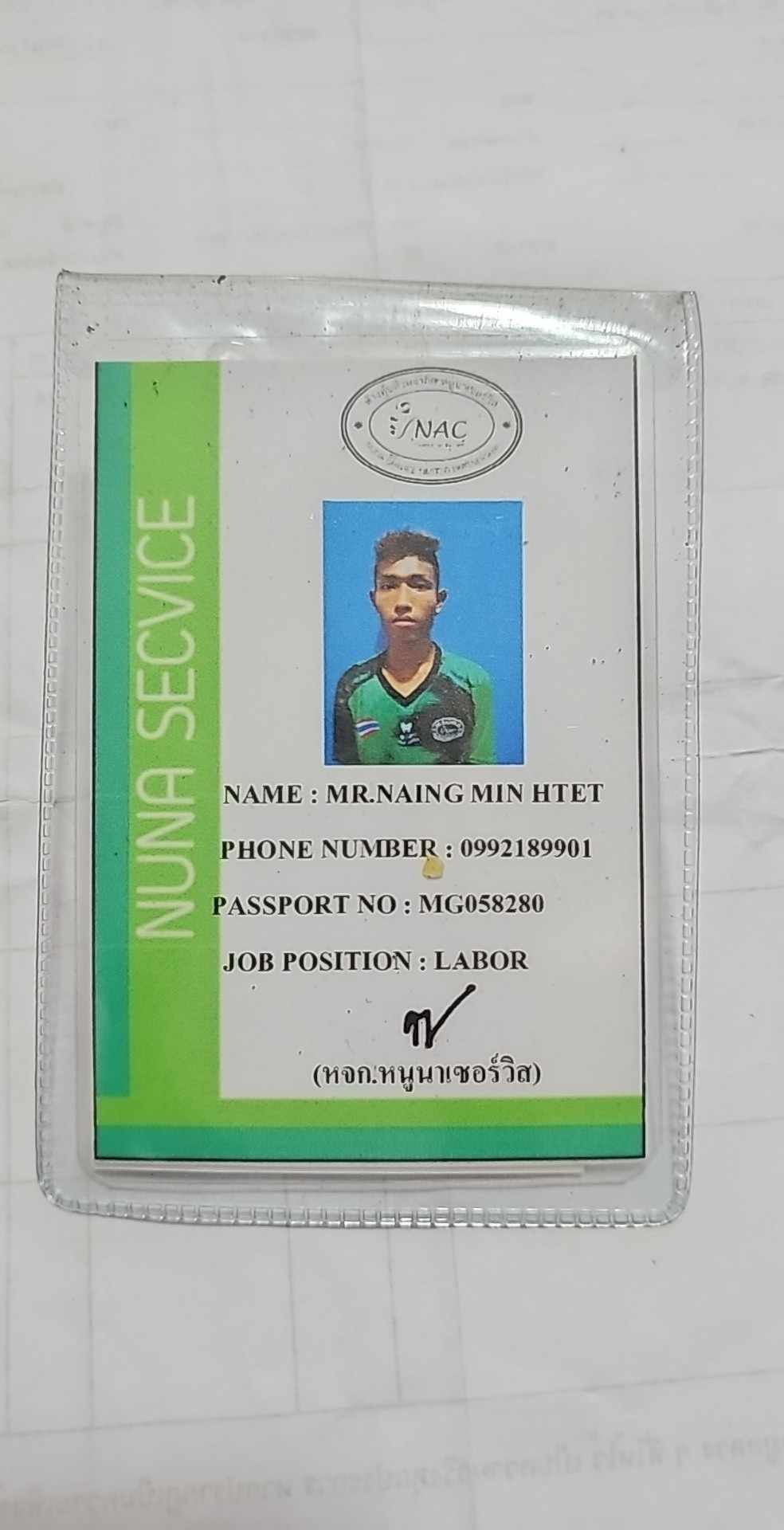
While seeing Ko Naing Min Htet who has been cheated with a card issued by brokers
Moreover, they were divided into groups and sent to Bangkok, Maha Chai and so on through illegal routes and they have been given a piece of paper with name list reportedly. Migrant workers are not allowed to travel beyond the area allowed by the paper, which they knew recently, Ko Naing Min Htet, a victim, told CNI News.
" We didn't know this at first. But I contacted my friends and asked them if the work was okay. They replied it was not okay. Some of my friends are finding it difficult to travel because they don't have documents. When my friends asked the brokers about documents, the brokers don't care. When my friends phoned them, they didn't answer the phone or they didn't listen." he said.
Although Thai brokers have really submitted the workers in the name list, because the work permit fee has not been paid, they have not been allowed to stay and work legally, Ko Thar Gyi, who is helping Myanmar workers, told CNI News.
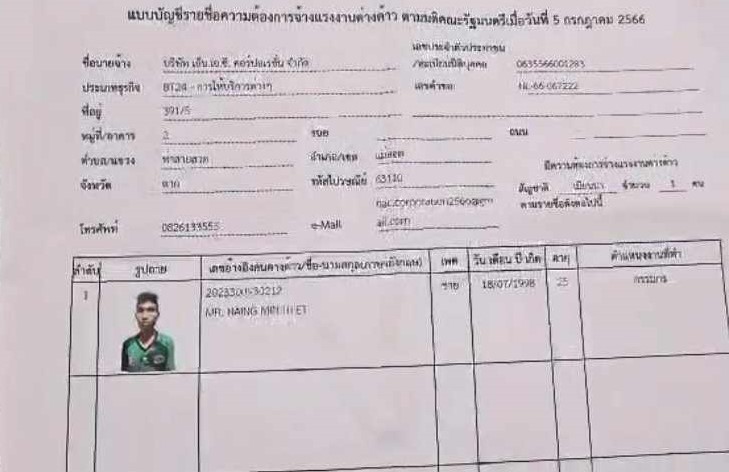
Name list paper issued by brokers
" Mainly, they want to get their money back. We are not sure whether the Thai broker will return the money or not. According to the existing law, the workers don't have to spend the money for the name list. I don't know why the broker hasn't returned the money. Thai woman broker hasn't paid the work permit fee. So, the receipt slip has not yet come out. A work permit cannot be made by a broker but by the government." he said.
The period of asking foreign migrant workers to submit in the name list has ended and those who have registered in the name list have been allowed to stay and work in Thailand until 13th February, 2025.

- By CNI
- Category: English Section
- Hits: 611
CNI News
19 October 2023
After the 8th Anniversary Celebration of the Nationwide Ceasefire Agreement (NCA) was held, the four-group workshop which contains the Tatmadaw, EAOs, political parties and civil societies could strengthen, which some people have commented.
The workshop on the NCA that was held from 2:00 p.m. to 6:00 p.m. on 15th October 2023 was attended by the Tatmadaw, EAOs, political parties, civil societies and discussion was conducted reportedly.
The Tatmadaw, EAOs and organizations all needed to discuss in order to strengthen NCA implementation, Sai Ai Pao, chairman of the Shan and Nationalities Democratic Party, told CNI News.
" We all have to consult. The Tatmadaw, the government, EAOs all have to consult and those who work from the side must encourage. The main is constitution. We have laid down the policy that will go to a federal democratic union. As there are many different kinds of federalism in the world, we need to choose the most suitable federalism that EAOs, the Tatmadaw and political parties can agree." he said.
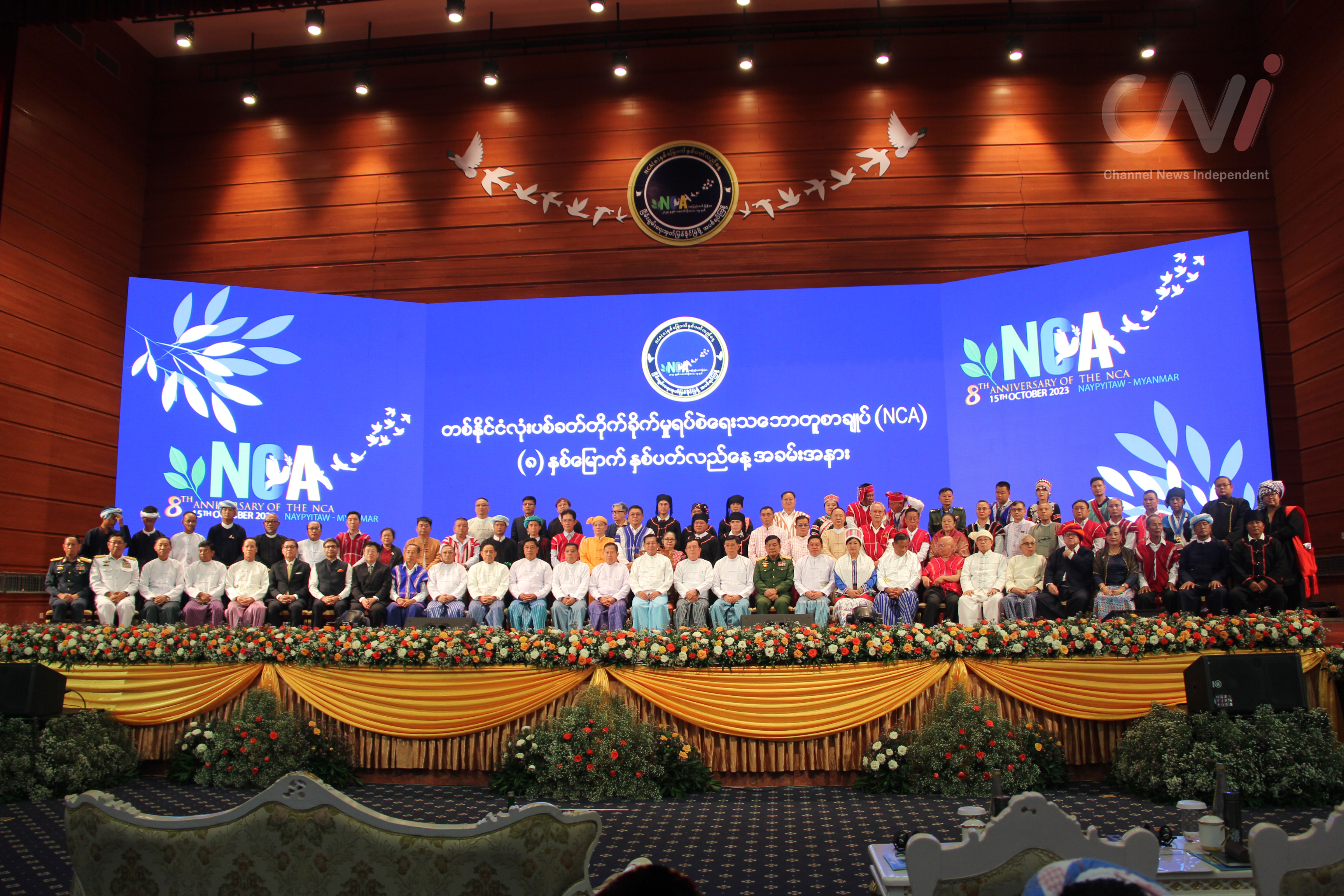
The 8th Anniversary Celebration of the Nationwide Ceasefire Agreement
While there were disputes that the NCA had been void, the 8th Anniversary Celebration of the NCA was held in Naypyidaw on 15th October 2023. After that, a four-party workshop on the NCA was held for implementation of the NCA.
No matter how much agreements and contracts were good, if man didn't carry out, they wouldn't impact, Sai Htay Aung, chairman of the Tailai (Shanni) Nationalities Development Party (TNDP) told CNI News.
" No matter how good agreements are, if man fails to carry out, they don't work. The Kachin Independence Army (KIA) and U Aung Min consulted to create the NCA in Laiza. KIA participated when the NCA was drawing near to finish. But KIA didn't participate at the time when the NCA was to be signed. The reason why KIA didn't go on participating in the NCA should be found out. We need to negotiated and discuss if someone deviates. Otherwise, it doesn't work." said Sai Htay Aung.
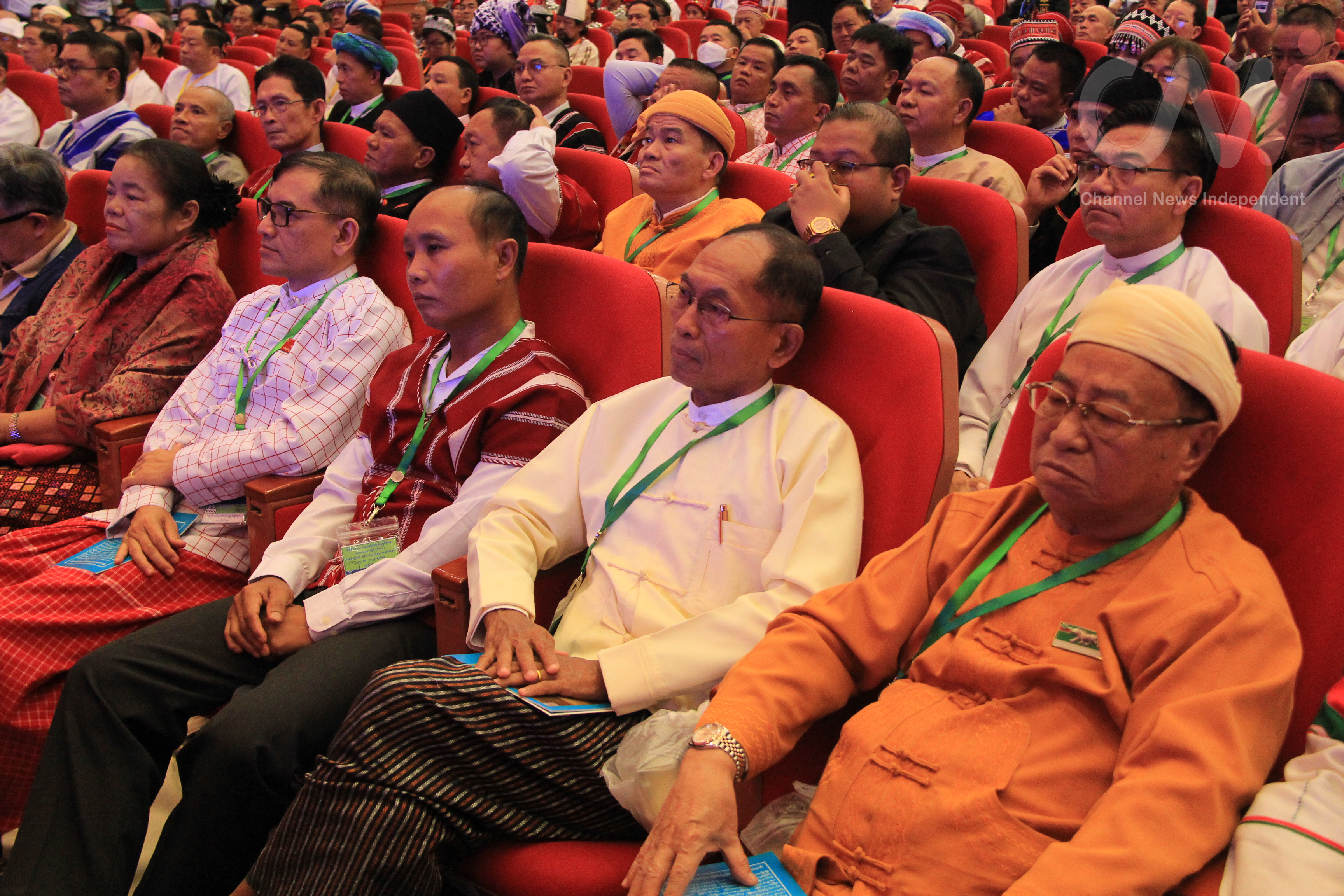
While seeing the delegates of political parties and EAOs at the 8th anniversary celebration of the NCA
Having said that the NLD government was trying to form a government without solving the ballot dispute in the 2020 general election, the Tatmadaw toppled down the government and took power.
And then, saying that the NCA has been void, the Karen National Union (KNU), the Chin National Front (CNF) and the All Burma Students Democratic Front (ABSDF) are fighting against the Tatmadaw.
In the same way, it is said that only humanitarian aids can be provided without ability to implement the NCA. However, because the NCA was approved by the Hluttaw and also signed by witnesses local and abroad, it would never be void, said Sr-Gen Min Aung Hlaing, chairman of the State Administration Council.
Moreover, among the EAOs that signed the NCA, seven NCA signatories said that the NCA hasn't been void.

- By CNI
- Category: English Section
- Hits: 850
CNI News
19 October 2023
Although the price of watermelon being exported to China from Myanmar is currently high to an extent at present, due to truck fare, parking fee and high tax, watermelon growers and traders are making a loss, said watermelon traders.
The cost of 16 tons of watermelons and truck fare is about 9,000,000 and the sales revenue is only about 8,000,000, Ko Thitsar, a watermelon grower from Sagaing Region, told CNI News.
" When we started exporting watermelon to China, the price was 1,500 yuan per ton. The price was not so bad. But due to the high cost and tax, traders make a loss. Suppose that out of 16 tons of watermelons loaded on a truck, 3 tons cannot be sold, you get 19,500 yuan for 13 tons of watermelon. In other words, you get 8,677,500 kyats. But you have to pay the tax and parking fees in both countries. The cost is 9,000,000 kyats altogether. So, you make a loss about 1,000,000 kyats." he said.
They So, some traders have suspended exporting watermelon to China and they are exporting to Yangon market. The entry of watermelons into the Yangon market reached a record high.
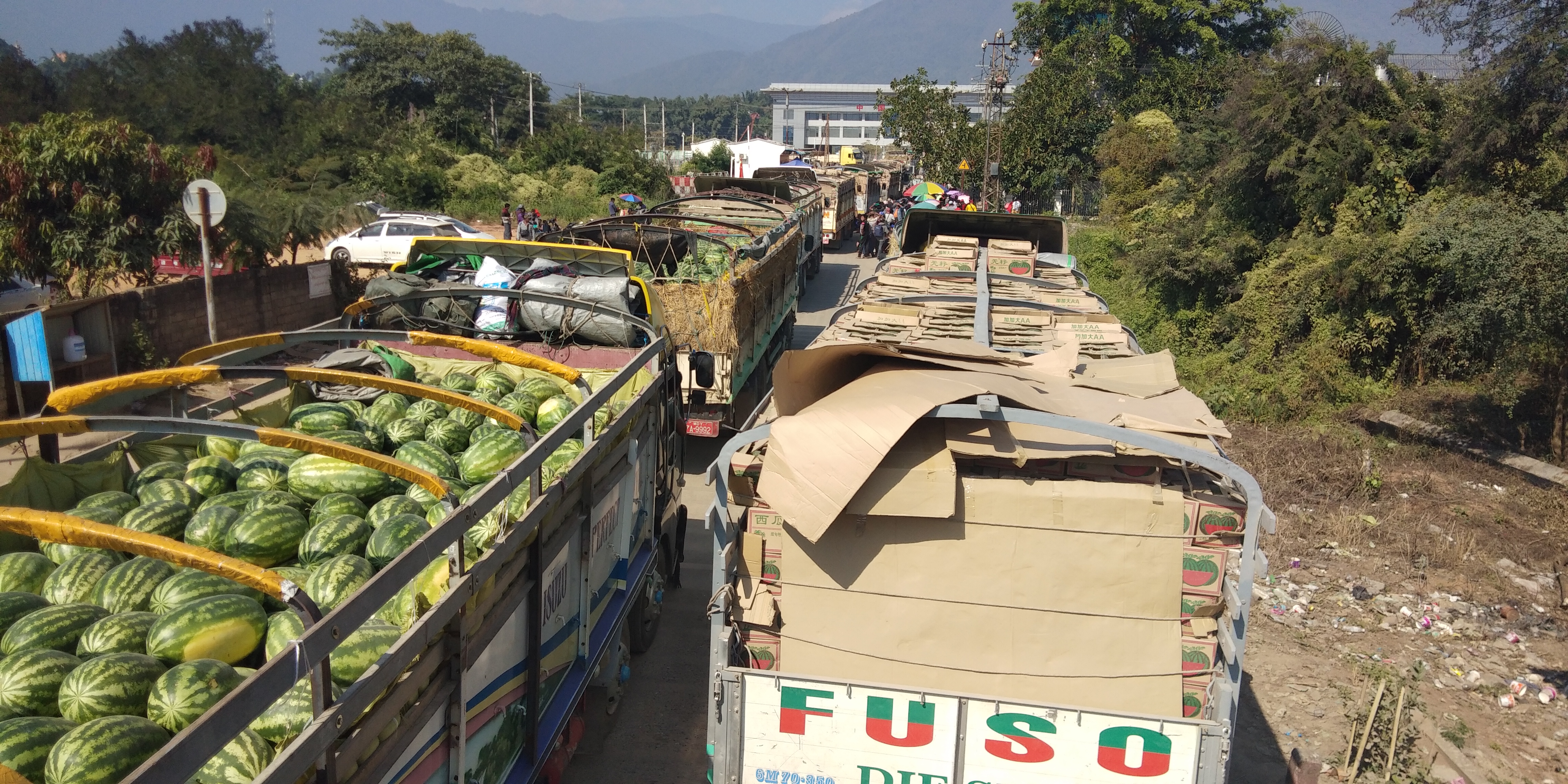
Trucks of watermelon that will be exported to China
At present, watermelon purchases from China are still low. If watermelon traders from many parts of China came and bought, the price of watermelon would be higher, a watermelon trader from Yangon told CNI News.
"I have never seen such a large number of watermelon trucks enter Yangon before. Their entry reached a record high. Because demand and supply are not equal in Yangon, sellers are finding it difficult. Mainly, distant Chinese buyers haven't come to buy as yet. If they come, the market will be bigger. Later, as the qualities of watermelon and cucumber has been good, there is a possibility that the prices will rise." he said.
If watermelons can be exported to China under a bilateral agreement, it will be more convenient for farmers reportedly. Moreover, if Chinese traders come to 105th-mile Muse trade zone and buy watermelons, costs will be reduced for Myanmar traders and farmers, pointed out watermelon traders.



